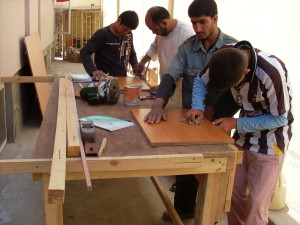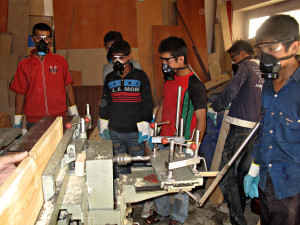 Many young men face family hardship and are forced to work on the streets to help support their families which often have only one parent. These youths are among the most vulnerable and exposed daily to extreme risk and danger. Our carpentry program has provided the boys with a marketable trade skill and a chance of full-time employment, a role in rebuilding Afghanistan and a significant improvement in living conditions.
Many young men face family hardship and are forced to work on the streets to help support their families which often have only one parent. These youths are among the most vulnerable and exposed daily to extreme risk and danger. Our carpentry program has provided the boys with a marketable trade skill and a chance of full-time employment, a role in rebuilding Afghanistan and a significant improvement in living conditions.
Each boy came to our workshop five days per week for one year. Half the day was spent in school learning basic literacy and maths and the other learning his trade. The boys came to our workshop daily for a 12-month period, received a small stipend to pay for transport, a substantial midday meal and a basic tool kit.
Throughout the year trainees gained experience working on diverse contracts, including office partition walls and furniture for the Ministry of Education, laboratory and kitchen cabinets, glass-panelled doors and other pieces of furniture for local businesses and markets. They learned and experienced a range of business models needed for small and large-scale contracts as well as managing peaks and troughs during seasonal changes.
More than 100 teenagers in this program have now become carpenters earning a steady income for their families.
Please note – AADO’s efforts to secure grants for this program have been unsuccessful, but we have persisted because vocational training courses in Afghanistan can only be accessed by young people already attending school. Around $30k is needed to run a year of vocational training for 8 teenagers. At a time of great pressure on Australian philanthropy, and with steep competition from China’s cheap furniture imports eroding opportunities for contract work for our trainees, the Committee decided this would be our last Carpentry program.
Carpenter stories
Atsmatullah was selling cigarettes and collecting scrap metal on the streets of Kabul before he was accepted into AADO’s carpentry project. He couldn’t afford schooling and wanted to help pull his family out of poverty. Afghanistan’s street-working boys are some of the most vulnerable people in the country. Daily they are exposed to extreme risks and dangers in order to provide for their families.
Many children like Atsmatullah have travelled with their families to Kabul from other provinces, forced from their homes by conflict or the loss of a parent, moving to the city in the hopes of finding a job that will put some food on their table. At a time when widespread reconstruction is taking place, skilled tradespeople are urgently needed in Afghanistan. However, few Afghans with technical and trade skills have returned to their country since the defeat of the Taliban in 2002.
Atsmatullah said:
Everyone likes to help their family to get rid of poverty and I never dreamed of how I would do this, but now I am learning something from carpentry and going to school. Now it is possible that I could reach that dream.”
Yaseen said:
I love AADO’s carpenter course. Before doing the training I sold telephone cards on the streets of Kabul and was treated badly by other street children. I was sad and felt lonely. Now, thanks to AADO I am working hard to become a professional carpenter. This is above my dreams, to work hard so I can support my family who are so proud of me.


